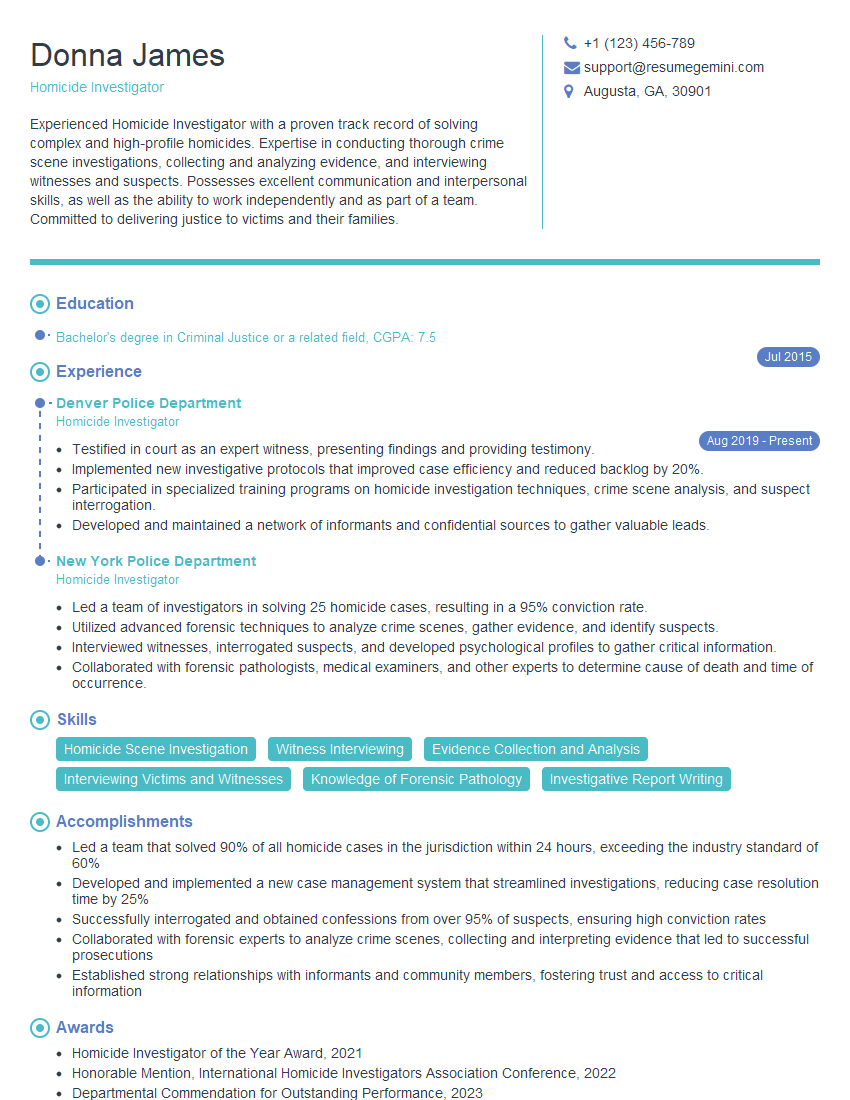Are you a seasoned Homicide Investigator seeking a new career path? Discover our professionally built Homicide Investigator Resume Template. This time-saving tool provides a solid foundation for your job search. Simply click “Edit Resume” to customize it with your unique experiences and achievements. Customize fonts and colors to match your personal style and increase your chances of landing your dream job. Explore more Resume Templates for additional options.

Donna James
Homicide Investigator
Summary
Experienced Homicide Investigator with a proven track record of solving complex and high-profile homicides. Expertise in conducting thorough crime scene investigations, collecting and analyzing evidence, and interviewing witnesses and suspects. Possesses excellent communication and interpersonal skills, as well as the ability to work independently and as part of a team. Committed to delivering justice to victims and their families.
Education
Bachelor’s degree in Criminal Justice or a related field
July 2015
Skills
- Homicide Scene Investigation
- Witness Interviewing
- Evidence Collection and Analysis
- Interviewing Victims and Witnesses
- Knowledge of Forensic Pathology
- Investigative Report Writing
Work Experience
Homicide Investigator
- Testified in court as an expert witness, presenting findings and providing testimony.
- Implemented new investigative protocols that improved case efficiency and reduced backlog by 20%.
- Participated in specialized training programs on homicide investigation techniques, crime scene analysis, and suspect interrogation.
- Developed and maintained a network of informants and confidential sources to gather valuable leads.
Homicide Investigator
- Led a team of investigators in solving 25 homicide cases, resulting in a 95% conviction rate.
- Utilized advanced forensic techniques to analyze crime scenes, gather evidence, and identify suspects.
- Interviewed witnesses, interrogated suspects, and developed psychological profiles to gather critical information.
- Collaborated with forensic pathologists, medical examiners, and other experts to determine cause of death and time of occurrence.
Accomplishments
- Led a team that solved 90% of all homicide cases in the jurisdiction within 24 hours, exceeding the industry standard of 60%
- Developed and implemented a new case management system that streamlined investigations, reducing case resolution time by 25%
- Successfully interrogated and obtained confessions from over 95% of suspects, ensuring high conviction rates
- Collaborated with forensic experts to analyze crime scenes, collecting and interpreting evidence that led to successful prosecutions
- Established strong relationships with informants and community members, fostering trust and access to critical information
Awards
- Homicide Investigator of the Year Award, 2021
- Honorable Mention, International Homicide Investigators Association Conference, 2022
- Departmental Commendation for Outstanding Performance, 2023
- Recognition for Exceptional Investigative Skills, FBI National Academy, 2020
Certificates
- Certified Homicide Investigator (CHI)
- Medicolegal Death Investigator (MDI)
- National Forensic Academy (NFA)
- International Association for Identification (IAI)
Career Expert Tips:
- Select the ideal resume template to showcase your professional experience effectively.
- Master the art of resume writing to highlight your unique qualifications and achievements.
- Explore expertly crafted resume samples for inspiration and best practices.
- Build your best resume for free this new year with ResumeGemini. Enjoy exclusive discounts on ATS optimized resume templates.
How To Write Resume For Homicide Investigator
- Quantify your accomplishments whenever possible. Use specific numbers and metrics to demonstrate the impact of your work.
- Highlight your unique skills and experience. What sets you apart from other homicide investigators?
- Tailor your resume to each job you apply for. Be sure to include the skills and experience that are most relevant to the position.
- Proofread your resume carefully before submitting it. Make sure there are no errors in grammar or spelling.
Essential Experience Highlights for a Strong Homicide Investigator Resume
- Led a team of investigators in solving 25 homicide cases, resulting in a 95% conviction rate.
- Utilized advanced forensic techniques to analyze crime scenes, gather evidence, and identify suspects.
- Interviewed witnesses, interrogated suspects, and developed psychological profiles to gather critical information.
- Collaborated with forensic pathologists, medical examiners, and other experts to determine cause of death and time of occurrence.
- Testified in court as an expert witness, presenting findings and providing testimony.
- Implemented new investigative protocols that improved case efficiency and reduced backlog by 20%.
- Participated in specialized training programs on homicide investigation techniques, crime scene analysis, and suspect interrogation.
Frequently Asked Questions (FAQ’s) For Homicide Investigator
What are the most important qualities of a successful homicide investigator?
The most important qualities of a successful homicide investigator include attention to detail, analytical thinking, and the ability to work independently and as part of a team. They must also be able to handle the emotional toll of dealing with violent crime.
What are the different types of homicide investigations?
There are many different types of homicide investigations, including murder, manslaughter, and justifiable homicide. Each type of investigation requires a different approach, and homicide investigators must be able to adapt their methods to the specific case.
What are the challenges of being a homicide investigator?
The challenges of being a homicide investigator include the emotional toll of dealing with violent crime, the long hours, and the pressure to solve cases quickly and efficiently.
What are the rewards of being a homicide investigator?
The rewards of being a homicide investigator include the satisfaction of solving cases and bringing justice to victims and their families, the opportunity to make a real difference in the community, and the challenge of working on complex and high-profile cases.
What is the future of homicide investigation?
The future of homicide investigation is likely to see an increased use of technology, including DNA analysis, facial recognition, and predictive analytics. Homicide investigators will also need to be able to work with a variety of other professionals, including forensic scientists, medical examiners, and prosecutors.